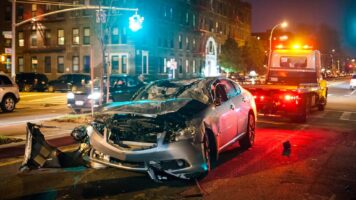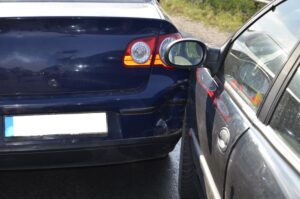You’ve sustained injuries in a car accident, only to discover that the driver at fault wasn’t the owner of the vehicle. Now, you’re left wondering about your rights—does the driver owe you damages, or does the owner? Perhaps both?
Unfortunately, the concise answer is that it varies. Legal liability for your injuries and losses may fall on either or both the driver and vehicle owner. Contacting a skilled Cap Girardeau car accident lawyer is the most dependable course of action to clarify your rights and secure the necessary compensation for medical expenses and other costs.
Let’s take a look at the factors commonly considered to determine who bears financial responsibility when you suffered an injury in a car accident caused by a driver who wasn’t the owner of the vehicle.
Determining Liability for a Car Accident
“Liability” for a car accident refers to a legal obligation to compensate a victim for the injuries and losses they suffered in a car accident. Such a legal obligation usually stems from the law or a contract. In this situation, it’s most commonly an insurance policy, which is actually a contract.
Fault in a Car Accident
Responsibility for an accident is determined by various legal principles, with primary emphasis placed on the party at fault for the crash, who typically bears financial responsibility for resulting injuries. Negligence, a common form of fault in the legal context, involves:
- A duty of care owed by one party to another, requiring refraining from unreasonably dangerous actions.
- Breach of this duty by engaging in unreasonably dangerous actions, putting another person at risk.
- The resulting injury caused by the hazardous actions, with the injury being remediable through financial compensation or other legal relief.
To illustrate negligence in a car accident scenario, all drivers owe a duty of care to fellow road users. If a driver breaches this duty by, for instance, speeding or driving under the influence, and such actions lead to an accident causing injuries, the law deems the driver negligent. Consequently, the negligent driver must provide financial compensation to the victims.
Beyond negligence, fault for an accident can stem from:
- Intentionally harmful conduct, such as road rage.
- Manufacturing or selling defective automotive products.
- Selling or providing alcohol to a minor or, in some states, an already intoxicated person, subsequently causing a drunk driving accident.
Legal responsibility for someone else’s fault in an accident can extend to individuals other than the at-fault party, even if they did not directly contribute to the accident’s cause. Two fundamental legal principles—vicarious liability and negligent entrustment—determine when and how this can occur.
Legal Liability for Another Party’s Fault
Vicarious liability is a legal principle that imposes strict liability on a third party for the wrongful acts of another. In car accident cases, vicarious liability often applies when an employee drives a vehicle their employer owns. Suppose the employee’s actions behind the wheel lead to an accident. In that case, the employer can be vicariously liable, allowing accident victims to pursue financial damages from the employer as well.
In most U.S. states, vehicle owners are vicariously liable for the negligent actions of a motorist only when the motorist is an agent or employee of the owner. Florida is the exception, applying vicarious liability to all vehicle owners, no matter their relationship with the driver causing the accident.
Negligent entrustment, another legal doctrine, holds an owner liable if they knowingly allow someone with a poor driving history or inadequate driving skills to use their vehicle, and the driver subsequently causes an accident with the owner’s car. This principle establishes legal liability for the owner in such circumstances.
Agreements to Assume Liability for a Car Accident (Insurance Coverage)
Apart from the liability imposed by law, individuals, businesses, and other entities can contractually agree to assume liability for a potential car accident. The most prevalent form of such agreements is through insurance policies, where an insurance company commits to covering its policyholder’s liability in the event of a future car accident. This arrangement involves the policyholder paying the insurer a one-time or periodic fee, commonly known as a premium.
In the United States, virtually every driver must have auto insurance to operate a vehicle legally. Different states have varying laws specifying the type and amount of insurance drivers must carry. However, there is a consistent requirement for all drivers to purchase liability insurance, covering damages they may cause in an accident that harms someone else.
Some states go further by mandating drivers to obtain “no-fault” insurance, also called personal injury protection (PIP) coverage. This coverage insures a driver against their own injuries and losses in an accident, irrespective of who is at fault. In these states, a victim’s no-fault coverage serves as the primary payment source of damages related to the crash. Generally, unless the victim sustains severe injuries and their financial damages surpass the amount of their no-fault coverage, seeking payment from an at-fault party’s auto liability insurance is typically not an option.
Who Bears Responsibility if the At-Fault Driver is not the Owner of the Car?
When a driver causes an accident while operating a vehicle they do not own, the interplay of the three general principles mentioned above will determine whether the owner, the driver, both, or another party is liable to the victims of the crash.
An experienced car accident lawyer will typically analyze liability in such a scenario as follows:
As previously mentioned, the general rule is that an at-fault driver causing an accident due to negligence or other blameworthy conduct will have legal liability to the crash victims. These victims generally have the right to pursue legal action against the motorist for monetary damages unless they reside in a no-fault insurance state and their own no-fault insurance covers all their injuries and losses.
Subsequently, if the vehicle owner is the driver’s employer and allowed the driver to use the car, knowing their dangerous or incompetent driving behavior, or if the accident occurred in Florida, the owner will also likely be legally liable to the crash victims.
Lastly, depending on the types and amounts of insurance coverage held by the driver, victims, and owner, and the state laws governing the rights and obligations of the parties involved, one or more insurance carriers may have a contractual obligation to provide financial compensation to the victims on behalf of the legally liable party.
What if a Car Rental Agency Owns the Vehicle?
Typically, rental car agencies aren’t liable for damages in car accidents when someone causes a collision while driving a rental car. In most instances, the at-fault driver in the rental car, along with their liability insurance policy (including any supplementary insurance purchased during the rental), is generally responsible for providing financial compensation to those with damages in the accident.
However, exceptions exist. As mentioned earlier, rental agencies, like any vehicle owner, may be liable if they knowingly rent to an unqualified or unsafe motorist. Additionally, rental agencies can face liability for accidents caused by their employees while driving a company car. Moreover, the law in many states might independently assign fault to a rental agency for an accident if the agency rents out a defective or inadequately maintained car that crashes due to being unsafe to drive.
What if the Vehicle is Stolen or Driven and the Owner Didn’t Know?
When a driver operates a car without the owner’s knowledge and is involved in an accident, the owner’s legal liability to a crash victim may still exist, contingent on the circumstances. The critical factor is whether the driver had the owner’s explicit or implicit permission to use the car. If they gave permission, the owner might be liable for damages to the crash victims. Conversely, if the driver stole the vehicle and did not have permission, the owner generally will not bear liability.
Types of Car Accidents
Car accidents come in various forms, each with its own characteristics and implications. Whether minor or severe, seeking financial recovery for damages is crucial, and a car accident attorney can assist in this process.
Single Vehicle Crashes
Single-vehicle crashes often result from factors like driver fatigue, intoxication, distractions, mechanical failure, speeding, or adverse weather conditions. Typically, the driver bears liability, but other parties can be at fault, including:
- Defective auto part manufacturers for faulty brakes.
- Another driver causing the crash, such as swerving off the road.
- Entities responsible for maintaining unsafe roadways.
Rear-End Collisions
Occurring when one vehicle crashes into the back of another, rear-end collisions are often linked to driver distraction, tailgating, and panic stops. They are prevalent in distracted driving incidents.
T-Bone Accidents
T-Bone accidents occur when the front of one motor vehicle collides with the side of another. Not obeying traffic lights or yielding the right of way commonly leads to these accidents. Also known as side-impact collisions, they often result in severe bodily injuries, with approximately 8,000 fatalities annually in the U.S.
Head-On Collisions
Head-on collisions are the most dangerous, involving significant force and often resulting in severe or catastrophic injuries. Causes include impaired or distracted driving and excessive speeds.
Sideswipe Accidents
Sideswipe collisions occur when two vehicles traveling in the same direction make contact. These can happen when one driver changes lanes without proper observation.
Injury claims from auto accidents demand a thorough investigation into the collision’s circumstances and liability. Car accident attorneys possess the resources and knowledge to determine accountability in your claim.
How Can a Car Accident Lawyer Assist You?
After understanding the complexities involved in an accident with a driver who doesn’t own the car, it may become evident that determining financial responsibility for your injuries and losses may require thorough investigation and research.
This is where the skills and knowledge of an experienced car accident injury lawyer become invaluable. Lawyers representing victims like you will explore the intricacies of car accidents, analyze the circumstances, and identify the parties liable for the financial repercussions. They work diligently to secure the maximum compensation from those responsible.
While each case is unique, a car accident lawyer can often obtain damages to cover:
- Medical Expenses: Necessary medical care for treating injuries and potential future health issues arising from the accident.
- Living Expenses: Goods and services essential for managing daily life during recovery, adaptation, or life with an injury.
- Property Damage: Repair or replacement of personal property damaged in the accident, including your vehicle, jewelry, clothing, groceries, sports equipment, and anything else in your car.
- Pain, Suffering, and Quality of Life: Compensation for the pain, suffering, and diminished quality of life resulting from the accident and the associated injuries. This may include harm to personal relationships and the new challenges of the injuries.
In some instances, a skilled car accident lawyer may also pursue punitive damages on your behalf. Courts may order payment of punitive damages when the at-fault party engaged in outrageous, extreme, or intentionally harmful conduct.
While lawyers cannot guarantee a specific outcome, seeking assistance from a qualified car accident attorney gives you the best chance of obtaining the maximum available compensation from the liable parties. It also gives you peace of mind that someone with experience is watching out for your best interest and the space and time you need to heal from your injuries.
Don’t Wait to Protect Your Rights After a Car Accident

Car Accident Lawyer, Daniel J. Grimm
Always contact a car accident attorney as soon as possible if you sustained injuries or lost a loved one in a motor vehicle accident in which the at-fault driver wasn’t the vehicle’s owner.
Remember you only have limited time to take legal action for monetary damages against the driver, the owner, or another party. The sooner you meet with an attorney, the better your chances of preserving valuable evidence, meeting legal deadlines for enforcing your rights, and obtaining the compensation you need to pay for your medical care and to return to living your life.
Case evaluations should be free with personal injury attorneys, so you have nothing to lose by learning about your legal options from a trusted professional.



